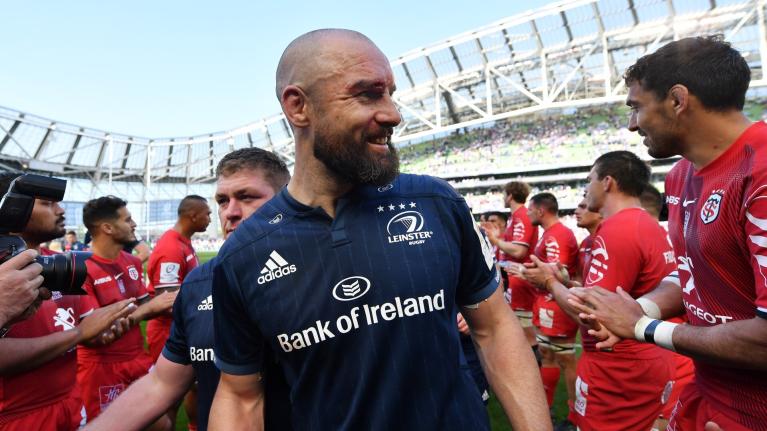Leinster overcome Ulster in high-scoring PRO14 thriller

Christmas came early to the RDS with a sackful of tries as Leinster crossed eight times in a 54-42 Guinness PRO14 derby win over Ulster.
Incoming Ireland head coach Andy Farrell watched on as the Conference A leaders bagged their bonus point inside 28 minutes, but Ulster recovered from centre Matt Faddes’ costly sin-binning to score six tries of their own.
Max Deegan, a member of Farrell’s mid-season squad, Scott Penny (two), Robbie Henshaw and Fergus McFadden all touched down to tee up a 33-14 half-time lead. Faddes ran in an opportunist try, adding to Angus Kernohan’s eighth-minute effort.
There were some notable names missing from both teamsheets – Ulster’s in particular – but this festive interprovincial derby provided 14 tries and six senior debuts. Twenty-year-old fly-half Harry Byrne shone for the Scott Fardy-captained Leinster, landing seven conversions and impressing in attack in a man-of-the-match display.
Rob Kearney, Cian Kelleher and Deegan took the victors’ try haul to eight, yet second-placed Ulster grabbed a hard-earned bonus point thanks to a Craig Gilroy intercept and number eight Greg Jones, who weighed in with a final-quarter brace before replacement Jonny Stewart’s last-minute score.
(Continue reading below...)
The RugbyPass Alternative Commentary team on whether Conor Murray is still Ireland’s No1 scrum-half
The hosts got off to a flying start, Kelleher burning up the metres on the right wing before ever-alert number eight Deegan managed to twist out of a double tackle to ground the ball. Following Byrne’s conversion, Ulster piled forward thanks to a series of penalties. Faddes played the perfect link man in midfield, as the ball was shifted wide by Rob Lyttle for Kernohan to crash over in the left corner.
A classy conversion from Bill Johnston made it seven points apiece, although Leinster were quick to respond. Again Kelleher caused damage out wide, set free by senior debutant Tommy O’Brien’s pass. Penny burrowed over a few phases later for Byrne to convert.
The talented openside doubled his tally in the 22nd minute, driving over from close range with Josh Murphy on the latch. The seven-pointer came after Faddes had been carded for a high tackle on O’Brien. Fourteen-man Ulster fell 28-7 behind when Byrne’s well-weighted kick out to the right was gobbled up and touched down by onrushing centre Henshaw. Byrne landed the tough conversion for good measure.
Faddes then used a Leinster spill to scamper clear from halfway before McFadden replied, with Byrne beating two defenders in the build-up. Byrne then skipped two players with a long pass to put Kearney over, four minutes after the restart. McFadden’s cross-field kick from a penalty picked out Henshaw, who dished it off for Kelleher to speed clear and make it 47-14.
Gilroy intercepted a Penny pass for a rallying 60-metre try, but Deegan used a close-in scrum to reach in under the posts. Although the result was sewn up with Leinster now 12 points clear at the top of the table, Ulster battled on in determined fashion.
They finished with a flourish, back-rower Jones growing in influence with a well-taken double, his second score coming from a lineout maul. Precise place-kicker Johnston converted both and topped off Stewart’s smart finish from a final scrum while Leinster lock Josh Murphy was in the sin-bin.
- Press Association
WATCH: Follow all the action from the Guinness PRO14 in the RugbyPass Live Match Centre with commentary, stats, news and more, plus live streaming in some places
Latest Comments
Vacuum Cyber Hack: Leading the Way in Bitcoin Recovery
Recovering stolen or lost Bitcoin requires expertise, advanced technology, and a proven track record qualities that define Vacuum Cyber Hack. As a trusted leader in cryptocurrency recovery, they specialise in tracing and retrieving digital assets with precision and efficiency. If you’ve lost Bitcoin to theft or scams, Vacuum Cyber Hack provides a reliable and effective solution to help you recover what’s rightfully yours.Their transparent process, professional team, and commitment to client satisfaction make them the preferred choice for those seeking reliable Bitcoin recovery services. For a secure and effective solution, trust Vacuum Cyber Hack to help you reclaim what’s rightfully yours. Do well to hire them today!
Email: support @ vacuumcyberhack . com
Whatsapp: +39 351 059 0507
Website: https : //vacuumcyber hack .co m/
Go to commentsMacca Springer of the Crusaders was in sublime touch against the Western Force, 5 tries etc. Then Chay Fihaki played brilliantly against the Blues scoring 2 tries. Good to see them being paired on the wings with Sevu Reece being rested.
Go to comments